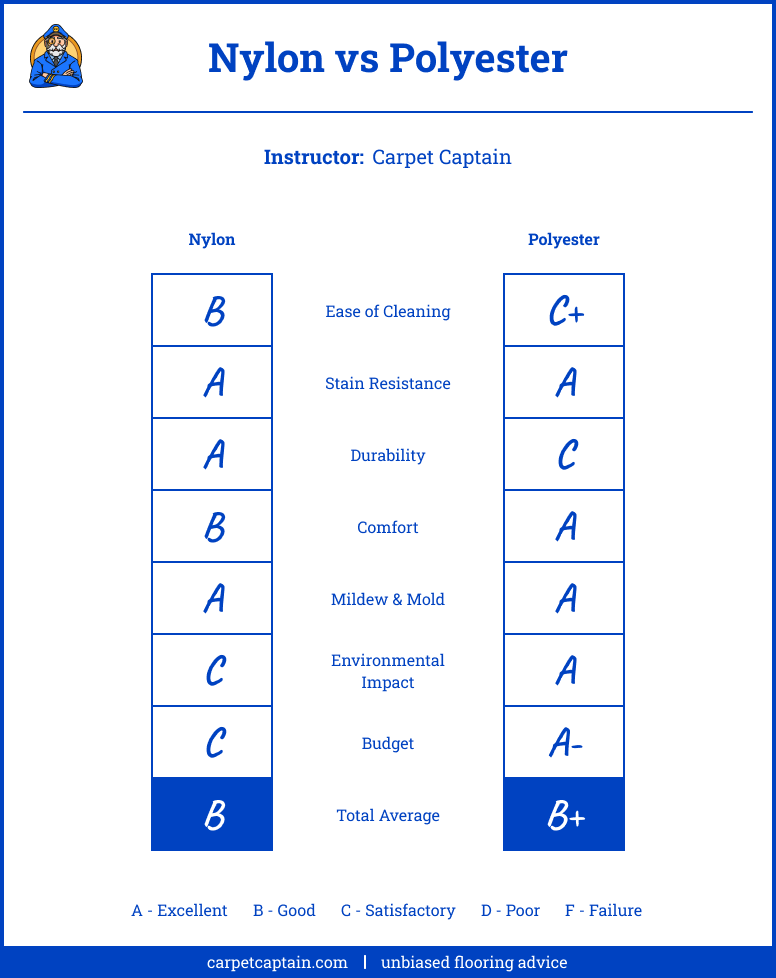Nylon vs Polyester Carpet Fibers: Which One Is Better for Your Home?
Nylon and polyester are two of the most popular carpet materials. And when buying carpet, carpet material is one of the most important decisions you’ll make. So this article is a good place to start when buying a carpet. It’ll help you choose whether you should install nylon or polyester in your home. I’ll break down nylon vs polyester carpet by durability, stain resistance, cost, and more.
Why is nylon vs polyester carpet fibers so important?
In short, because carpet material is so important to how your carpet will perform. (you can check out other important factors here). Just like if you compared wood versus metal baseball bats or granite versus vinyl countertops, the material you choose directly impacts performance. So material is important, but why just focus on nylon and polyester? Because they are by far the most popular. The other carpet materialsare either luxury (really expensive), rarely seen, or have poor durability. Want an installer to help you with choosing your carpet material? HomeAdvisor is a company that does the homework on choosing a good installer for you.Click here to enter a form with your zip code to get free quotes from pre-qualified installers in your area.
Captain’s clarification! When I refer to polyester in this article, I’m talking about traditional polyester. Newer generations of polyester, such as Smartstrand, are a completely different animal. Luckily, most of these new polyesters aren’t ever called polyester. They are referred to by their brand name (eg. Smartstrand), so you don’t confuse the two.
Comparison of cost
I’m going to cut to the chase here: Polyester is about half the cost of nylon. Many factors play into the cost of carpet, so this is by no means an exact rule. In some cases, a well-made polyester will cost more than a poorly-made nylon. But on average, polyester will cost about $2 sqft. and nylon will cost $4 sqft. “You get what you pay for,” right? For the most part, yes. Nylon is superior, but polyester still wins the battle in a couple more categories. Keep reading to see if those categories are important to you.Which is more durable?
When it comes to carpet performance, durability ranks on the top of most homeowners’ lists. After all, it’s tough to like a carpet that doesn’t last. When buying carpet, you’ll have to look at multiplecarpet specifications to determine the carpet’s durability, but none are more important than the material you choose. So which is the winner of this prized category? Nylon by a long-shot. Nylon is considered the most durable carpet material (although some say Smartstrand gives it a run for its money). Polyester leaves something to be desired in the durability department. It tends to crush and show wear after a few years in high-traffic areas.Which has better stain resistance?
When I talked about durability, I’m talking about how well the carpet fiber holds up. But there’s another side to durability and that’s how stained a carpet is. It doesn’t matter how long your light gray carpet holds up if it has red and yellow stains all over it. Here’s the good news: You don’t have to cry over spilt milk with either carpet material. Nylon and polyester are forgiving when it comes to stains. But a couple of warnings here: First warning is that “forgiving” on stains doesn’t mean it won’t stain. You’re best cleaning up spills ASAP. Second warning is that some nylon carpets resist stains better than other nylon carpets. With polyester, the stain protection is a natural part of the fiber. Nylon needs to be treated. If you’re interested, learn more at the Captain’s article on thepros and cons of nylon carpet or read my review of DreamWeaver Carpet, which produces both nylon and polyester variant. For this reason, polyester gets the slight edge on stain resistance.Which has better styles and appearance?
The carpet material won’t affect the appearance (if you’re interested in appearance, check out the page on carpet styles). I take that back—it can impact it a little. Specifically, polyester is easier to dye. That means it comes in the boldest of colors. This used to be a bigger advantage than it is today because nylon’s come in a rainbow of colors, too.Which is softer?
Softness is another win for polyester, but just like colors, the gap between polyester and nylon is closing with technology. Traditionally, nylon is a rougher material than polyester. But today’s nylons can be manufactured in thin fibers that make them silk-soft. But I’d still say if softness is key, go with polyester.Which is better for the environment?
Full disclosure: I got this one wrong when I first started writing about carpet. Polyester is marketed as a “recycled carpet.” This isn’t a lie. Polyester carpets are partially made with bottle caps and other recycled materials. So polyester is the environmental winner, right? That’s what I thought. But it turns out it’s not that easy. While polyester is made of recycled materials, it is difficult to recycle once you remove it. On the other hand, nylon is the by far the easiest carpet fiber to recycle.
Captain’s green secret!Did you know your old carpet can be recycled? If not, don’t feel bad. I surveyed my readers and only 22% know recycling carpet is an option. It’s said because carpet is the #2 product in landfills. Learn more about these statistics and how to recycle carpet here.
Which is better in a basement or room with a moisture problem?
Both nylon and polyester are synthetic fibers that resist moisture. The bigger problem you’ll have with basement moisture is the padding, backing, and moisture trapping beneath the pad and subfloor. So don’t worry if you choose nylon or polyester for the basement, but check out our article on moisture barrier padding if it’s a concern.Which is better for allergies?
Nylon vs polyester carpet tie in the allergy department. Allergy suffered face two challenges when it comes to carpet: make sure no mold/mildew develops and make sure the carpet is not a dust mite trap. For the mold problem, both nylon and polyester are synthetic and resist mold. This doesn’t mean you’re in the clear. You may still get mold that has nothing to do with the carpet fiber (see above). For dust mites and other allergens getting trapped in carpet, the carpet material won’t make a difference. You can go with nylon or polyester. But on that notes, some people argue that carpet is better for allergies because it does trap the dust that otherwise would float into your air and into your lungs. Basically, the carpet acts as a giant filter. The key is to vacuum the carpet frequently enough to remove the mites and particles. Check out my favorite vacuums and tips to make your carpet last as long as possible at the Captain’s vacuum buying guide. And if you’re worried about your new vacuum dispersing dust into the air, consider buying a water filtration vacuum. As the name suggests, these models use water to trap dust particles within the cleaner itself and are thus very allergy-friendly!Captain’s tips on what you should do next:
Which is the better carpet nylon or polyester? It’s really a personal question, and hopefully a question you now have an answer to. So what should you do next?- If you want to see all of your carpet material options, check out our page on carpet materials comparison.
- If you want step-by-step tips on buying carpet from start to finish, check out our free and unbiased carpet buying guide.
- If you want to get get connected with a pre-qualified installer in your area, click here to get 3 free quotes (note: I get a small commision that helps support the site)
Average Cost To Install Carpet Flooring
Price Range: $845 - $1,650
See costs in your area


What is your opinion on Dreamweaver carpeting?
Hi Susan,
We have a review of Dreamweaver carpet where we look at different aspects of the product – costs, quality, maintenance, colors, types, Pros & Cons, etc.
Is PET carpet considered polyester and have the same characteristics listed for polyester?
Yep, it is polyester, just a different name.
I’d like to see a pro comment about not just durability, but how they handle or hold up to vacuuming. I seem to conclude that Polyester doesn’t hold up to vacuums as well as nylon. I tend to have to believe this because they are recycled plastic and that can be less reliable than nylon in its actual end result structure and how it holds a twist from what I have read twists come undone and frizz up. I still made the mistake of ordering polyester now twice. I have noticed this to be true for me.
Agree–nylon definitely holds up better with vacuuming. It’s a stronger fiber. That said, a well-made polyester carpet shouldn’t fuzz while vacuuming (note: some carpets naturally shed when you first get them, and this can be normal)
You don’t mention toxins. I’m concerned about what chemicals they are using in these products.
Good call–I’ve been trying to update many pages with health concerns because that’s a topic I overlooked originally. With carpet, much of the chemical concerns come in backing, adhesives, and padding. I’ve got an article specifically on lowing VOCs (airborne chemicals) here That should help you out–I think looking at the certifications of the carpet as a package is going to be more important the fiber you choose because every nylon and polyester varies. Feel free to comment on that article if you still have questions.
I’m thinking of putting a 5×7 area rug under a kitchen table we eat at daily. One is nylon the other polyester! Neither are expensive rugs from Kohl’s and Target in mostly gray w/ a white design on the gray! My delemia is ther will be dropped foods and spills, even if grown children now sit there! And I’m thinking of friction on the carpet with shoes rubbing on carpet under the table! What would you do!
I think all things being equal I’d go with the polyester. There won’t be too much “foot traffic” under a dining room table (unless people are really grinding their feet!), and it will have the edge in stain resistance, which I suspect will be the bigger problem. The nylon could have good stain resistance too, but it depends on how it’s treated, and in this case, you probably don’t know. Could consider rug pad under it as well (https://www.carpetcaptain.com/rug-guide/rug-pad-guide/).
I have severe allergies to fumes from some carpets. Does Nylon have less fumes
Fumes usually come from treatments to carpet. The problem with nylon is it’s not a great fiber unless it’s treated for stain resistance (it’s not naturally stain resistant). For this reason, I give the edge to polyester. There are many other factors that come into play and ways you can significantly reduce your exposure to fumes. I wrote an article you can check out on carpet emissions here: https://www.carpetcaptain.com/carpet-buying-guide/is-new-carpet-safe/